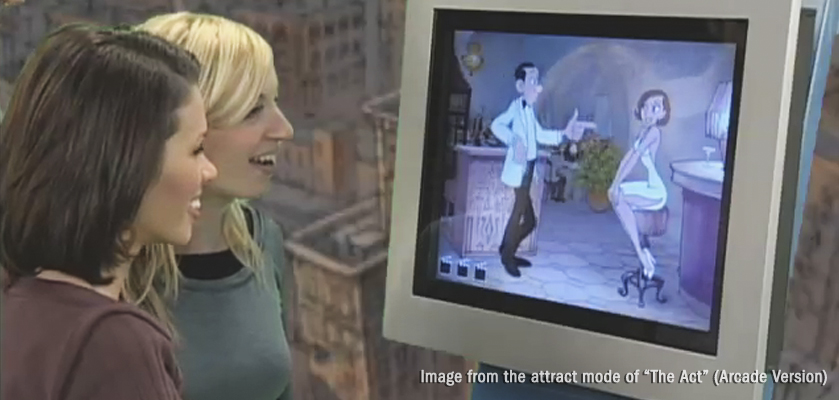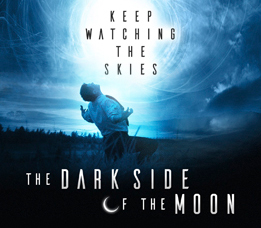




Creator of THE ACT

A personality game, as Cecropia founder Omar Khudari describes it, is a video game where "something is going on in the characters' heads (you can tell from their facial expressions and body language). And what's going on in their heads is what the game is all about."
"The Act" is Khudari's first attempt at creating a personality game and it took six years and two dozen animators to create. The finished product is innovative, charming, and endlessly enjoyable.
In the game you play a window washer named Edgar who's trying to win the affection of a nurse named Sylvia. The fully-animated interactive movie has no dialogue and is all about reacting appropriately to the body language of those around you. From the first frame to the last, this is the most original game we've played in years.
FMV World recently talked with Khudari about the process of making the game and his take on the future of interactive movies:
FMV WORLD: How did you get involved in the video game industry?
Khudari: In college, I majored in philosophy which has no practical value. So I
studied a little computer science in college in order to be
employable. When I graduated, I got only two job offers: one from a
defense contractor and one from a game developer (for half the money).
I took the game job.
What are some of your favorite video games?
I have not been a serious game player for many years. In college, I
played a lot of Centipede, Joust, Asteroids, and Adventure. Later, I
had a serious addiction to SnakeByte on the Apple II. My favorite
story game was "Below the Root" on the Atari 800. My favorite
multiplayer game was M.U.L.E. I also had a thing for Super Mario World.
Where did the idea come from for the innovative gameplay of "The Act?"
In 1982, Electronic Arts published an ad with the headline, "Can a
Computer Make you Cry?" The ad predicted that computer games would
become a storytelling medium to rival film. It said that Electronic
Arts was "inventing the language" of this new medium. That never
happened. But many game developers thought it would happen and tried
to make it happen. I was one of those. I tried many different ways. I
made a "surrogate travel" game. I made a "branching narrative" game.
In 1986, I heard a speech by Stan Cornyn at the first CDROM conference
in Seattle. He predicted that we would soon be able to "go to the
movies with a steering wheel." A lot of us in the audience thought
about watching a movie and turning a wheel, and what would happen if
you turned the wheel. We hit a problem: all our ideas were about
controlling physical movement. But movies are about more things than
physical movement. My favorite movie was "Casablanca." That was about
love and honor and faith and betrayal. How could you turn a wheel and
make love and honor and faith and betrayal happen? Another favorite of
mine was the screwball comedy, "What's Up, Doc?" How could you turn a
wheel and make comedy happen?

Please tell us a little about the process of making the game for you and for the animators. Without any precedence or references for this type of gameplay, was it difficult to develop the game?
It was very difficult to get the animation from my imagination onto
the screen. At first I thought it was a communication problem. I
tried many different ways of explaining what I wanted. I cannot draw
well, so I used photographs, videos of actors, and detailed
descriptions. I could not get the very specific emotions and attitudes
that I wanted. I struggled with that for a long time. Then, in 2003,
we heard that Walt Disney Feature Animation was shutting down its
Orlando studio and laying off 350 people. We called their human
resources office, and they introduced us to their animators who were
looking for work. Suddenly it became a lot easier. There was still a
big communication challenge, but we developed a pretty good system.
Were you inspired by other games or movies? Which ones?
We watched a lot of Charlie Chaplin for inspiration. "The Act" is all
pantomime, and Chaplin was the greatest.
What was the response to the initial arcade release?
There was never a commercial coin-op release. We tested extensively in
bars and other arcade locations. We always got very positive
"qualitative" feedback, but the quantitative was disappointing. That
is, the coin drop was not adequate to support a commercial release. We
have been told by coin-op experts that we broke a lot of rules of how
to design a coin-op game to eat a lot of quarters. Coin-op games are
supposed to be easy to understand, difficult to play. Ours is
difficult to understand, easy to play.

Are there any current plans to port the game to a home video game system (Wii, XBox Live) or to home computers?
Not at this time.
What do you see for the future of interactive movies? How might they evolve?
I had an English teacher in 8th grade who told our class, "If you want
to be a writer, be sure to write about people, because that's what
people are interested in." I think interactive movies have to evolve
so that they are more about people and less about travel and fighting
and other action.
What projects do you and your company have on the horizon?
We are applying what we learned from making "The Act" to making Flash-based web-deliverable experiences. I'm calling them "Flash Comedy Skits." One thing that is very refreshing about Flash is that it is
very inexpensive to give the whole world access to what we are doing
(completely unlike coin-op). We will post our progress on our web site at TheActGame.com.




